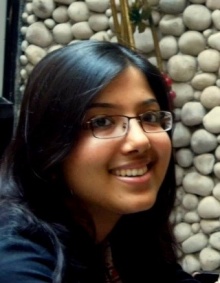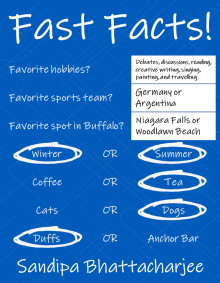Graduate TA Spotlight – Sandipa Bhattacharjee
Sandipa Bhattacharjee is a PhD student in the Department of Economics studying applied microeconomics, specifically labor economics and development. During the fall and spring semesters, Sandipa TAs for Introduction to Macroeconomics (ECO 181) and Introduction to Microeconomics (ECO 182). During the winter and summer sessions, you can find Sandipa teaching Introduction to Macroeconomics (ECO 181)!

Sandipa Bhattacharjee
Why did you choose economics? Why did you choose your subfield?
SB: In his ‘Theory of Motivation’ paper (1943), Abraham Maslow structured his revolutionary concept – the Maslow’s hierarchy of needs – in the form of a five-layered pyramid that arguably epitomizes the individual psyche of man. I was in school when I first came across this hierarchy that classifies the basic needs of a person – physiological, security, love, self-esteem and self-actualization – in order of decreasing importance – and I wondered if there was an underlying science, a unifying theory that holds these layers together. Throughout my years of academic endeavors and educational pursuits, I recognize Economics to be the one that efficiently threads this pyramid together in human society and realize the imperative to master this subject as my first step towards understanding and deconstructing the various issues that throng the world economy today. The plethora of issues that one can delve into with the correct economic toolkit is what mesmerizes me. All the issues that plague human beings today can be interlinked within Maslow’s pyramid, and I am convinced that economic research holds the key in dissolving those.
I chose Labor Economics as my subfield because I am inclined towards working in applied microeconomics with applications of econometrics. I have come across some crucial microeconomic problems plaguing the poorest sectors of developing economies. I want to delve deeper into the concerns thronging the labor market especially those regarding quality of education, jobs, social influence and labor productivity. Growing unrest in the public health sector and health insurance markets and the widespread inequalities in the prevalent healthcare access system are among some of the raging issues that plague the world today. I wish to direct my efforts towards studying the economic problem and analyzing the policy effectiveness and strategies for improving the quality of healthcare and labor market conditions in achieving an employment intensive pro-poor growth of the economy.
Which class in the major has been your favorite and why?
SB: ECO 666- Microeconomic Theory II (taught by Prof. Peter Morgan) – This course was the stepping stone to my learning curve as a Microeconomist. My mathematical knowledge and the microeconomic foundations became clearer and I realized how much I love Economics. I wish this course continued throughout my PhD program!
ECO 796- Empirical Methods for Applied Economics (taught by Prof. Joanne Song McLaughlin) – This course helped me to understand how to formulate economic problems and understand several empirical techniques that economists use for research.
What research are you working on right now?
SB: Currently I am working on how age discrimination affects older workers and has a negative impact on their health status. As COVID-19 spreads throughout the United States and the rest of the world, the resulting disruptions to the economy mean that it is highly likely the incidence of age discrimination will increase. This may include employers laying off older staff members or not considering older candidates when rehiring. This short-term thinking ignores long-term consequences that will affect people of all ages. Discrimination can have a negative impact on a person’s self-esteem, it may also have a negative impact on their physical health.

Fast Facts
What was your favorite class as an undergrad?
SB: Econometrics (because I appreciate the fundamentals of statistics) and Classical Political Economy (I loved reading about political liberalism and individualism, neo-classical economics, Marxism, sociological and cultural theories etc.).
What is your top piece of advice for your students?
SB: Take advantage of the academic resources that the university provides (dashboard, group discussion forums, office hours etc.) and communicate more with your professors, friends and classmates. Don’t be intimidated to ask questions and interact as much as you can as it helps you to understand the concepts clearly and develops your social skills.
What is one thing that you recommend students do while at UB?
SB: Get involved in events and network with new people. UB offers plenty of opportunities – UB Toastmasters (teaches public speaking and leadership skills), small trips to the nearby places that the university organizes, etc.